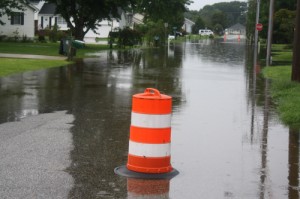
The Berlin Mayor and Council is on the verge of creating a stormwater utility that’s rooted in worthwhile goals but questionable methods to accomplish them.
It’s no secret Berlin has chronic flooding problems in several areas of town. We believe most of these problems are due to poor planning in the development stages of several residential communities, such as Henry’s Green, Henry’s Mill and Jamestown Place, but the town’s aging infrastructure and cluttered ditches are also to blame.
Back in 2007, an Army Corps of Engineers report on flooding was completed after three years of studying the problem. At that time, an infrastructure committee was appointed to carry out recommendations made in the report. That committee’s work never truly materialized, largely due to former Mayor Tom Cardinale’s death and an uncertainty among remaining council members about the financial feasibility to carry out the recommendations.
Fast forward to 2013 and the recently completed study by the University of Maryland Environmental Finance Center. This is a complicated document that basically calls for creating a stormwater utility to address recommendations included in the report. The new utility would essentially be a new town government department that will lead efforts to improve drainage and carry out major projects to curb chronic flooding.
The report’s findings sound banal enough and worthwhile, but the devil is in the details and there’s a lot to be concerned about, most notably the expense associated with creating this new town department.
Last week, Berlin businessman and accountant Jay Bergey was blunt in his criticism of the report as well as the Mayor and Council’s acceptance of its financial recommendations and the town’s desires to move forward with the utility. Bergey thinks the entire report is a “boondoggle” and finds it unacceptable that approximately 80% of the cost to maintain the utility in annual fees will be on the backs of town businesses.
While residential customers will pay an annual fee of $50 under the current plan, commercial property owners will have to pay $25 per Equivalent Residential Unit, which is a measurement representing the individual parcel’s amount of impervious surface, such as roofs, sidewalks and pavement. This will be a significant new line item for businesses to deal with and is particularly disturbing considering private businesses have played little to no role in causing the town’s flooding woes.
“It’s just not fair to put a systemic problem, a town systemic problem, and put the financial onus on a few individuals in the town to solve that problem,” Bergey said at last week’s council meeting.
Bergey is right, and there has to be another more practical and less expensive way to address flooding.
Under the town’s current structure for non-resident customers, the local Board of Education could be facing exorbitant costs under this proposed fee structure for its schools located in Berlin limits, despite each school already having in place its own stormwater management plan. The same goes for Atlantic General Hospital as well as the community banks located inside town corporate limits.
Beyond the fairness issue is realism. A $8.3 million revenue bond has been proposed to carry out the utility over 10 years, but there is much speculation and doubt in the finance world on whether that can even be attained in the first place. Disturbing was the fact the center’s report did not calculate any sort of interest into that revenue bond. That will be at least another $1 million, analysts predict.
It’s clearly not responsible to burden the small town of Berlin with this kind of debt. However, the town needs to do something to address chronic flooding, even if it was largely caused by poor development practices and the fact the town’s underground infrastructure is dilapidated on many fronts.
According to the town ordinance currently being proposed and the subject of the public hearing on Monday, Jan. 28 at 7 p.m. at Town Hall, “The Council finds that all real property in the town contributes to runoff and either uses or benefits from the maintenance of the stormwater system. All real property in the town, … shall be charged the fee.”
We are not sold on the need for a stormwater utility and all the massive expenses that come with it. Measures need to be taken to address flooding in Berlin, but we think the Army Corps of Engineers’ flooding report from five years ago is a better place to start and deserves a revisit, in cooperation with the most recent study.
Berlin has essentially done nothing to address its flooding problems over the years. We would prefer to see the town tackle stormwater drainage projects that will make an immediate impact and replace its aging stormwater pipe system than add another level of bureaucracy to government and further dip into business and residential bank accounts.
No matter where you stand on the matter, we encourage residents and business owners to attend the public hearing next week to learn more about the proposal and how it will impact them.

